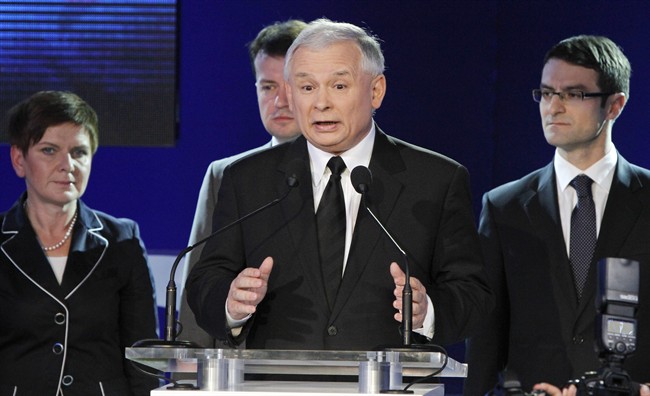WARSAW, Poland – Polish Prime Minister Donald Tusk took his first steps toward building a new government Monday after his centrist ruling party became the country’s first ever to win re-election since the collapse of communism in 1989.

Results of Sunday’s election show that his pro-European party can maintain a narrow majority in parliament with its small coalition partner – a sign of deepening stability in this nation of 38 million.
As well as being the first time in 22 years of Poland’s post-communist history that a ruling party has won a second consecutive term, Civic Platform’s success brought an end to a string of defeats for incumbent governments in Europe. Over the past year or so, a swathe of governments from Ireland to Latvia have been kicked out as they bore the cost of the economic turmoil.
In another first, Palikot’s Movement, a new left-wing party that opposes the church’s influence in political life in this conservative and mainly Catholic country, entered parliament as the third largest force. It seems to be benefiting from the country’s growing secularism and disenchantment with the established parties. Thanks to its strong showing, a transsexual and an openly gay activist are now poised to take seats in parliament, also unprecedented.
Tusk took his initial steps toward creating a new government on Monday after the state electoral commission issued a near-final vote count that left no doubt that he is the winner. With a little over 39 per cent of the vote, Civic Platform won nearly 10 per cent more than its nearest challenger.
Tusk met with President Bronislaw Komorowski, who said all logic indicates that Tusk will remain as prime minister. Under Polish law it is the president who charges the victor with forming a government.
Tusk also consulted with his party leaders and met with Waldemar Pawlak, the head of his coalition partner, the Polish People’s Party, a socially conservative group that represents farmers’ interests and won around 8 per cent of the vote.

Get daily National news
After the meeting, Pawlak said more time was needed and talks would continue Tuesday.
“It is very important today to build a government that will be based on a strong majority and that will guarantee a stable functioning of the country, because times are difficult and the situation on financial markets shows that a lot of responsibility is required from state offices,” he said.
Analysts said the result suggests the government will continue with the broad thrust of its policies, which have been marked by close co-operation with the European Union and using EU funds to modernize a country still struggling to catch up economically with western Europe.
The government has also tried to modernize the country and jolt the economy by privatizing state-run enterprises. Economic development on its watch has been impressive. The economy is growing at 4 per cent this year, though it is expected to slow to around 3 per cent next year in the wake of the broader slowdown across Europe.
Critics, however, fault it for not going further in reducing regulations and otherwise reforming a country still trying to overcome the economic legacy of communism. Unemployment is nearly 12 per cent and wages are still relatively low – problems that have pushed hundreds of thousands of Poles in recent years to emigrate to Britain and elsewhere.
The budget deficit has also been growing, and the ratings agency Fitch said Monday that the new government should implement more “drastic” fiscal measures.
“The slowdown in Poland and the wider euro area crisis could knock Poland off course unless further, more structural action is taken,” Fitch said.
Poland has been shielded from some of the turmoil by not being part of the eurozone. It has also benefited from an influx of EU subsidies that have stimulated development, while its large internal market maintained an appetite for consumption even during the global slowdown.
Markets reacted positively to the news, with Poland’s main stock index, the WIG-20, up 3.2 per cent in the afternoon, making it one of the best performers in Europe.
“Overall, the outcome of the elections is good news for investors as pro-market policies are likely to be continued and there should be a solid parliamentary majority for fiscal reforms,” Danske Bank said.
A count by electoral authorities from 99.5 per cent of constituencies, Civic Platform was well ahead of its main rival, the conservative Law and Justice party of former prime minister Jaroslaw Kaczynski, which garnered nearly 30 per cent support. The twin brother of President Lech Kaczynski, who died in a plane crash last year, acknowledged his defeat Sunday night.
The count shows that a renewed coalition of Civic Platform and the Polish People’s Party could have 234 seats in the 460-member lower house, or Sejm.
The two parties enjoyed a drama-free relationship, at least in public, that added to the government’s stable image – and contrasted with the public fighting that had marred past governments. Though the parties had some disagreements, they appeared to work them out behind closed doors.
The new left-wing party, Palikot’s Movement, was in third place with 10 per cent. Led by entrepreneur and maverick lawmaker Janusz Palikot, the party has gained popularity promising to support gay rights, liberalize the country’s strict abortion laws and legalize marijuana.
The only other party that would make it into parliament is the Democratic Left Alliance, which won slightly over 8 per cent of the votes cast.
That marks a sharp decline for the party, the successor to the Communist party that ruled Poland before 1989. It has held power off-and-on since communism fell in 1989 but has seen its popularity decline steadily in recent years. In this election it appeared to lose voters to Palikot’s Movement, which shares many of its ideological positions.
Party chairman Grzegorz Napieralski announced Monday that he would not put himself up for re-election when his party next votes on its leadership.
_____
Monika Scislowska contributed from Warsaw.







Comments